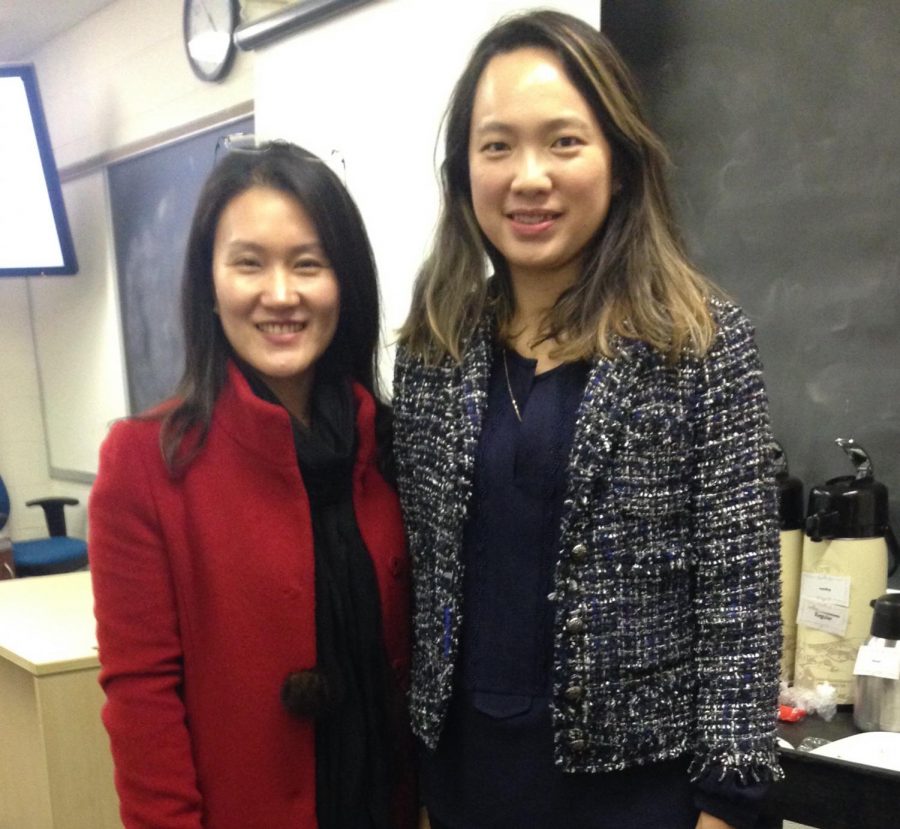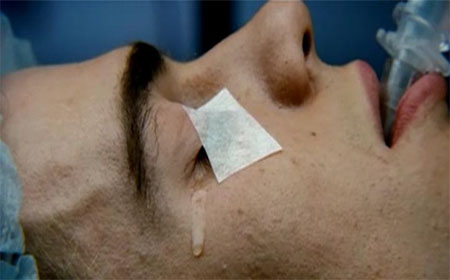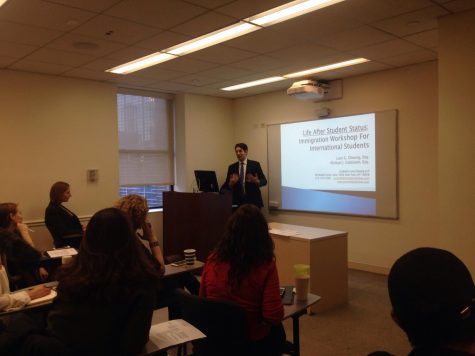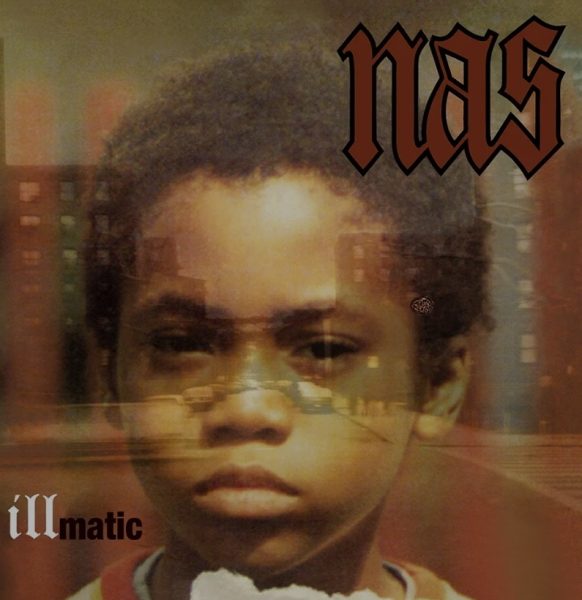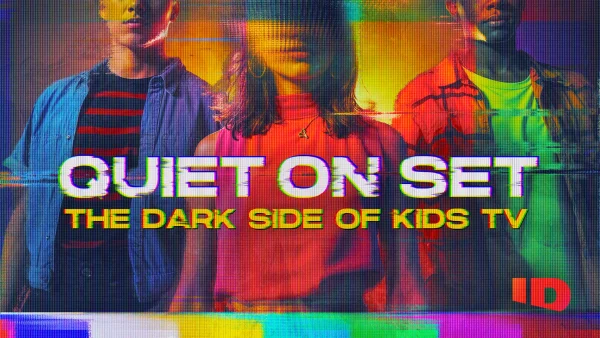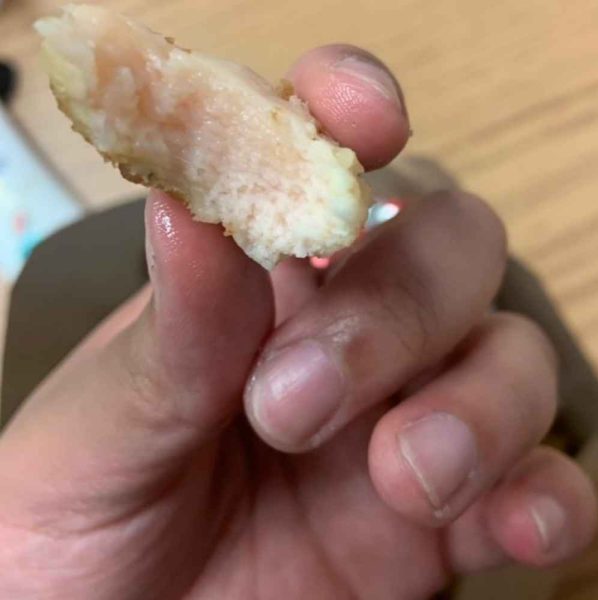Teaching Students to End Bullying, Discrimination and the Stigma on Mental Illness (Long Version)
In order to end the tolerance on issues affecting individuals and society everyday, we must be the voice of change and empower the victims in order to overcome those issues. That is the message that all three guest speakers wanted to project to students on November 16th.
Dr. Sheila Gersh who is the Center for Global Engagement Director asked three professors of Mercy College to be a guest speaker for Tolerance Day, a day in which students are taught about how to end the tolerance on issues going on in society. Each speaker was told to give a presentation of their own field of intelligence. They spoke about bullying, the stigma on mental illness and discrimination.
Jeehee Sung opened up the event by speaking about mental illness, what it means and the stigma that is associated with it. Sung can relate to mental illness because she suffered from a major depressive disorder in freshmen year of college. She wasn’t aware of what lead to her depression considering that there are many factors to it. She found the help she needed with family support and time out from school to focus on her health. Today she is a professor at Mercy College teaching for three years in psychology, marriage and family therapy.
“I’m not ashamed of it, it’s made me who I am. Now I can help students that went through the same things I went through. That experience helped me be in this field” says Sung.
Sung is considered lucky to have a family that’s open-minded and willing to help her, not many people get the support that she did. Many students pointed out that in their culture mental illness is not considered a problem when Sung asked them how their culture defines mental illness.
According to National Alliance on Mental Illness, mental illness is a condition that affects a person’s thinking, feeling or mood. It may affect someone’s ability to relate to others and function each day. Even with the same diagnosis, each person will have different experiences.
Mental illness has many myths that people may assume are true, Sung made a power point mentioning all the myths that are told about mental illness. One being that mental illness affects only a few people which is not true. It is very common and it affect people of all ages, income level, culture and education. Another myth about mental illness is that it is caused by personal weakness which isn’t, it is caused by genetics, environmental and biological social factors. The last myth that many people believe especially nowadays is that people with mental illness are violent. People with mental illness are more likely to harm themselves than they are to others.
“That’s still on ongoing discussion. It’s finding a reason for those perpetrators, it’s easy to say those people are mentally ill. But there was research done that says that mental illness does not associate with violence, they are not dangerous to others but to themselves.” explains Sung.
It is harder for people to acknowledge who has a mental illness because unlike physical illness, you can’t see it. People are aware that someone is sick because they can see the physical symptoms but unless someone tells you that they have an illness that can not be detected by appearance, then you can’t really know. “People with mental illness are just like us. I hope the students can see that mental illness is along the same lines of physical illness so we can impose any stigma or judgement towards them.” says Sung.
Kokulaba Mujunangona who is a senior and majoring in general accounting knows what’s it like to have people not understand what someone is going through. She has speech impairment since she was six years old and autism. She was put in special classes because her speech was very bad.
“ Mental illness is a strong issue in society. People don’t find it serious. They look for an excuse to deny it or hide it. Having speech impairment is hard. My professor talks too fast and I can’t understand him, I don’t think he notices that I can’t observe all that information when he talks fast,” says Mujunangona
The stigma that mental illness is not as serious as other illness is one of the major problems that it faces. It’s looked down upon and many victims are to blame for an illness that they cannot control. Sometimes they aren’t even aware that they are mentally ill, just like Sung wasn’t aware of her depression.
“No one blames you when you have cancer but when you have mental illness, they tell you to snap out of it. That stigma of mental illness prevents people from seeking help and it makes them feel that there is something wrong with them.” informs Sung.
Anna Gedrich who is the Director of the School Professional Workshop Program teaching teachers on how to control a situation that involves bullying. “I think people who haven’t experience these situations, say you can just brush it off, you’ll be fine but don’t realize how much it effect the person.” Geresh adds.
But it isn’t the stigma on mental illness and the effect of not knowing that prevents patients from seeking help. Time and money is also an obstacle that they must face. It’s far too expensive to find a treatment that is appropriate for their income level as well as finding time to get the treatment the patient needs. There is also a stigma within that, the fact that if they use their insurance which would go on their records, scares them. They don’t want to be judged based on their illness in the work field or anywhere they go. Sometimes health insurance doesn’t even cover the mental illness treatment.
The impact of the stigma can make a person reluctant to seek help or treatment. Not having the support or understanding of their family, friends, co-workers, among others can make them feel outcast or alone. Having mental illness can also mean getting fewer opportunities in school or social activities and having trouble finding a job or a house. Getting bullied or harassed can also be a problem due to the stigma on mental illness. The belief that they won’t succeed or improve their situation is very common. Individuals with mental illness can also suffer from negative effects of the disorders.
In order to stop the stigma on mental illness, we should be willing to talk about mental health as well as learn and share the facts about the illness. Encouraging equality between physical and mental illness so people know that in both cases the person is hurting. By knowing about the treatments they can reach out and seek help. Raising awareness about mental illness is very important because not a lot of people are familiar with the effects it has on the individual, their family and the people around them. They aren’t knowledgeable about the myths and truths on mental illness. Through education and attending events like this one, people can increase the awareness by learning and listening to experts in that field.
“If we know what causes it and the treatments, people can understand that this isn’t a characteristic flaw, it’s an illness just like a physical illness. Tell your journey because there is nothing to be ashamed about. Talk about it openly so people can feel comfortable to share their condition and hopefully end the stigma.” Sung says.
Geresh believes that it is important to attend events where they talk about issues, stigmas and stereotypes to students so they can help try to end it.
“Having events like this is a great way to stop the stigma. Awareness is important and helpful to have mental illness experts come in and speak. To meet people is very important. It helps people understand that people with mental illness look just like us, ”Gedrich adds.
Chelsea Kuo who was the second guest speaker is a sociology teacher who spoke about discrimination. Just like Sung, Kuo has her own personal story that connects to her topic of presentation. She started her speech by sharing a story that happened about 6 months prior to the event in which she was discriminated during her yoga classes. As she entered her yoga class, she put her belongings in a table in which everyone puts their belonging in. But as she was getting ready to start her classes, a white woman insulted her by saying ‘get your dirty Chinese laundry off my bag.
“I felt embarrassed, ashamed and angry. I wanted to yell at her but the class was about to start. The whole time, I was thinking how I should address the situation. The reason why it hurt me was because I buy into it. I would feel less hurt if it was someone below me but because she was white, I felt less than her and she had more power over me.” said an emotional Kuo,whose voice seemed to crack while sharing her story.
Mujunangona who also saw Kuo’s presentation, felt Kuo’s pain because she was also discriminated against her race.
“Kuo was very emotional, I wanted to talk to her aside because it’s… so painful. They want to knock you down but as much as you want to ignore them, you can’t” recalls Mujunangona who was also emotional while discussing the topic of discrimination.
“I never felt discriminated until Donald Trump won the election. I was in my church and some people were saying racist chants. They also talked behind my back. I didn’t say anything because it could come back to haunt me.” says Mujunangona.
But it doesn’t only affect Mujunangona but also her family. She recalls a time where her cousin was trying to find a babysitter for her child and couldn’t find anyone to take care of him because of the color of his skin. That’s why the topic of discrimination affects her in many ways. She listened closely to Kuo’s story to figure out ways one should react in situations like this, in this case figure out how Kou approached the situation and the woman.
Kou had time to think before she did or say anything. She kept questioning herself while she was in her yoga class, ‘Why did I see her as a dominant group? Why not see her as just another person?’ Instead of giving the woman the power that she think she has, Kuo decided not to approach her but instead leave with her head held high and slightly nod at the woman. Although, it wasn’t easy to do that, Kuo thought things through before she took any action. The nod came from a place with no anger, it was a way for Kuo to show the women that they were both equal, what the woman did, didn’t effect Kuo even if it hurt her inside. She felt sorry for the women’s lack of education but didn’t hold her lack of education against her.
“Maybe I didn’t do good by not confronting her but I saved myself from not being the victim, I felt that I was higher. I’m not my race, I have more qualities in me so putting my race against me doesn’t hurt me. I nodded at her because I don’t want to hold anything against her.” says Kuo
Geresh thought it was a remarkable response from Kou’s side. She believes that by Kou responding that way, she gave the woman a positive impression of her and the people that associate with her race and culture. By not yelling and confronting her, it showed the woman that she didn’t win, she didn’t have the power to make Kou feel small and let it get the best of her even if it made her mad and upset.
“ If she would have yelled it would have reinforced her impression of her and have negative feelings of her culture. That reaction probably surprised her, she was probably expecting her to yell but she didn’t, which I thought it was remarkable.” mentions Geresh.
Mujunangona thinks otherwise.“She should have confronted the person in a nice way and tone. One on one, not in front of people. Ask the woman why she discriminated against her? ”
Although both agree that confrontation could have been an option. Kuo feels that by confronting them, it already shows that they had a power over you.
“ We are not just a victim. We are a victim because we acknowledge and rectify that hierarchy. Thinking back in the yoga class,I kept thinking do I discriminated against those people. My plan was to scream at this person but I didn’t want to be like her, I don’t want to be the one to discriminate against people for their lack of education or weakness. I want to be kind and equal to this person.” said Kuo.
She spoke to students about the different types of discrimination, the individual, the institutional and the symbolic. Individual discrimination is a person who discriminates another person. Institutional discrimination is the mistreatment of an individual or group as a whole. Symbolic discrimination is a belief system that prejudice against black people in America. Discrimination goes way back into history and it seems not to be changing in the sense that people do still discriminate others based on their race, ethnicity, gender, religion, sexual orientation, etc.
“I think racism has it’s history and it’s human’s nature to categorize people based on stereotypes. People use whatever they can to hurt you and others and race is a easy card to play. Racism comes from colonial times. Studies says that blacks are seen as inferior because colonial power made it that way, whites put all the negative quality in them and all the positive quality in themselves.” says Kuo.
Sometimes discrimination is not visible to people. When somebody calls you sweetie or blondie, you don’t automatically know that you are already being put in a category without even noticing it. Being called those thing is seen as friendly gesture but no one really sees the whole picture. People are so embedded in their culture and their own bias that they don’t see or acknowledge the discrimination they are being put in.
“Ironically, this is the most harmful type of discrimination. The noticeable culture hierarchy and the fortunate minority agreeing with the culture hierarchy. It’s relative , as a human being we never examine ourselves very frequently. I’m sure sometimes I do something to make someone else feel uncomfortable or discriminated.” says Kuo.
As she was explaining to the students that sometimes people discriminate others without knowing. She unknowingly said “we, girls” in the classroom filled with females but didn’t realize that there was man in the classroom recording the event. In a way, she discriminated him without knowing. Of course, she rectified and apologized for her mistake which he accepted but in other cases someone might not accept the apology.
“We give people second chances, like he forgave me but I should be more aware of what I say. I should have more sensitivity in that part through education and self-awareness. In most cases, they probably won’t tell me unless I suddenly realize.” says Kuo.
A few years ago when Kuo started teaching, Kuo unknowingly asked the students how many boys and girls are in the class, without realizing that there was a transgender in her class. She wasn’t aware that in her classroom, there was someone with a third gender.
“We were all once in a role of a discriminator and discriminated. We all discriminate without knowing at some point”
Mujunangona can also relate to that issue where she didn’t mean to discriminate someone but did unconsciously. She was talking to another person of the same color of skin about work. He said that he could find any work and that there wasn’t any jobs out there so Mujunangona said along the lines of ‘some blacks are not educated that’s why they don’t find a job, you need to push yourself harder.’ She realized that she hurt his feelings and apologized for it. They don’t speak anymore because of the situation that occurred.
“I discriminated him without meaning to. He was upset about it but I didn’t mean it that way, I apologized to him and he accepted it but I felt bad. I think I was having a bad day and took it out on the wrong person.” says Mujunangona.
Studies have shown that people who are less educated, tend to discriminate others. The lack of education and not being aware that everyone is equal, reflect on who they are, not on who we are. Discrimination is not a problem for us, it’s a problem for them because they are the ones who see differences in people, not the ones being discriminated but of course it’s those who are being discriminated that get hurt.
“I try to block those types of people who discriminates, not hate them. I’ve been more understanding about it now. I think educating them more, interact with someone that is not your race is great way to try to prevent discrimination to continue to go on in the future. It’s up to us now. We need to unite and come together and fight against it. We need to continue to put our voice out there and change it.” Mujunangona says.
Geresh believes that people are not willing to change unless they personally understand what it means and until they have a personal connection to the issue from another person then they will understand that everyone is equal.
“Connecting to people is very important, getting out of your comfort zone and seeing how it feels like to be in someone else’s shoes in order to understand them. Creating a climate where discrimination is not acceptable. Where you shut those things down and people learn to be respectful.” says Geresh.
What does Kuo suggest people to do regarding to discrimination?
“We need to stop feeling victimized and start feeling empowered. We need to find ways to stick up for ourselves. In order to end discrimination, one must not believe in someone else’s hierarchy. When you already have the mindset that someone has more power than you, then you start to let them overpower you. “The colonizers successfully makes the colonized feel that they don’t belong. If you take the power away from the colonizer, your free.” advices Kuo.
“There is no easy solution. Not just educate those who discriminate, but also empower the person being discriminated and how to deal with that. Why are minorities being punished by the bad things people do? They discriminate against us and the minority is affected by it as a result. We need to stop relying on them to change. We need to tell victims what they should do to change that.When we have more power then we can change the world.” continues Kuo ending her presentation with a powerful message.
The third and last speaker was Dr. Ilene Rothschild who is the associate professor of Mercy College. She spoke to students about bullying and how to prevent and end it. She spoke about DASA which stands for The Dignity for All Students Act. The act is intended to protect students from discrimination and bullying in a safe environment.It also promotes from positivity in school grounds and in classrooms. It requires schools to incorporate diversity and sensitivity into lessons in class. It requires one employee from each school to attend a training program where they are taught how to respond and recognize bullying and harassment. Bullying incidents should be reported to the New York State Education Department annually so they can keep track of the school’s performance.
“We want to know what is going on in school and in the community to try to prevent bullying from occurring. It’s not only teachers that need to be trained but everyone else because it works as a team.” says Rothschild.
Rothschild showed the students a video about how to help someone who is getting bullied and how to stick up to bullies. She gave the students statistics on how many students report bullying and those who don’t. The statistic are from 2013 to 2014, 22% of children report the bullying while 79% of children don’t report the bullying. When things don’t get reported, it can escalate to depression or even suicide. Sometimes bullying situations are left unnoticed because many people don’t come forward to report the bullies.
“ Unfortunately a lot of people don’t report those situations and that’s a problem. We want to encourage them to feel comfortable and report this types of things so we can do something about it. Knowing that there is help when they need it.” Geresh informs.
Bullying doesn’t only affect the person getting bullied but also the bully. Students who bully have an increased amount of academic problem and may lead to taking drugs or having a violent behavior. Students who are being bullied are at risk at doing poorly in school, have difficulty sleeping and may lead to being depressed or having anxiety.
“ Awareness is the most important thing. Know what’s going on in the world around you. Bring people together and investigate anti-bullying programs that you can get involved. When you see injustices, get involved.” advises Rothschild.
Geresh, who specializes in the field of having teachers connect with their students and prevent or stop bullying from occurring, knows that her job is very important and could save lives.
“My job is to make sure that bullying doesn’t happen here. We take it very seriously, we have six hours with the students and it’s not enough time to do a ton. But we can at least reinforce some ideas about what is the key in the process. Students feel hopeless in the point where they don’t know which way to turn and that should not be the case.” say Geresh.
Jada Ward who attended the bullying event and is a junior and majoring in psychology believes that by going to events like this students can address the situation instead of ignoring it. She advises students to help someone who is being bullied by talking to them and listening to what they have to say.
“They don’t always need someone for advice but just someone who is willing to listen. Be there for them in anyway possible because they want to be heard. So they know that someone cares.”says Ward.
Bullying comes in many shapes and forms. It can be physically, mentally and emotionally damaging for a victim. It targets anyone, the way they look, dress, speak, belief, etc. It happens in school grounds most of time but with the increase of social media, cyber bullying has become the number one strategy in targeting victims. Cyber bullying is done behind a phone screen or in a computer, done with the intention of hiding their identity and given the freedom to write any negative comments about someone else without facing any consequences.
“They can’t see the person face to face. You don’t see and feel the victim’s emotion. You don’t face any consequences online than you would in person and you don’t know who the bullies are most of the times.” says Ward.
Back then when technology wasn’t around, bullying only occurred in the school and ended when classes was finished. But now, it follows people home. It never stops and it spread quickly whereas back then people didn’t hear about someone or something as quick as they do now. Not only is it constantly there to haunt someone all time but the person who is saying negative comments about another person sometimes can not be detected.
“ It’s easier for people to be anonymous with all these apps. When your anonymous, people feel brave to do things and that they will never say face to face. They have some sort of freedom behind a computer or phone screen than in person.” informs Geresh.
Because technology is rising, parents and teachers need to adapt to the new era and know what the students and kids are doing online. “It’s important to get parents and teachers to become knowledgeable about the technology that kids are using and getting involved with it. As teachers, we teach them digital-citizenship which shows them how to behave in the online world, what to post and what to say. Teaching them about their digital-footprint like what you get out there may be consequential in the future. Kids are not really aware of what happens when they throw things in the online world.”explain Geresh.
Geresh knows a lot about these struggles students face when they are being bullied because she has had personal experience with bullying, being on both sides and with her knowledge and experience she tries to help the students.
“I was bullied as a kid and sometimes I the bully. I can relate to that pretty well. I spend most of my working job focusing on issues like this, that relate to education, that talk about discrimination and bullying. It’s really important to me that I’m involved in this in a professional way.” explains Geresh.
Mujunangona who was also bullied during middle school by people talking behind her back and in high school because of her speech and autism, throughout these years she only had a few friends and didn’t have someone to lean on. She believes that by communication, bullying can decrease and people can start to branch out and speak up.
“ Students don’t address bullying in the right way, they need to talk to the bullies to stop the bullying and not deny the situation. Right now I am trying to interact with the person that bullied me to try to come in terms with each other.” says Mujunangona.
The goal is to prevent bullying from happening through education by educating students and even teachers about how to confront or cope with a situation that deals with bullying. Setting rules on what’s expected and accepted in school grounds is a great way to let students know what the shouldn’t and should be doing.
“People can learn from one another instead of discriminating one another because of ignorance. If you educated people more, they are least likely to use those things against somebody.” says Geresh.
Schools are trying to reward good behavior instead of punishing bad behavior. It’s a way to reinforce positivity. Bringing awareness about bullying in classrooms is a great way to inform students about it. By reading books and talking about it in all sorts of subject is important because talking about it it in the classroom can becomes a regular discussion everywhere.“An up stander is someone who stands up for someone. We should stand up for one another instead of being a bystander.” says Geresh.
All these topics and issues come together in a way that it relates to one another. They affect people in the long run if they don’t seek the right help and treatment. Bullying goes hand in hand with the stigma on mental illness and discrimination because both leads to someone getting bullied. Or if you’re mentally ill, you can be discriminated. All these three issues join together and manipulate people into thinking that someone else has power of you because of things that you can not control. You can’t control our skin color, race, gender, religion, all the things that make you who you are. People try to bring others down by the things that they can not control which makes them feel that they have the power over somebody but that isn’t the case. It goes back to education and learning about mental illness, bullying and discrimination. People are not educated and tend to be on the negative side of the spectrum. It’s within you to change that around and not be willing to give them the power that they want over every else. Everyone needs to come forward and acknowledge these issues but also not buy into the hierarchy because then you are under this mind twist that someone has more powerful than an individual and you need to knock that down.
Events that teach you on how to overcome the issues in society is the best way to end those issues. But the first step is to attend these events, for the student who came and learned about these issues leave with a sense of empowerment and knowledgeable.
“The event helped me a lot, people need to have self-control. It was powerful and strong. I felt relieved and encouraged to speak up and I am going to speak up more. I’m glad I went to this event, it made me realize that I need to be more aware of my surroundings.” concludes Mujunangona.
Even the professors who came out to talk to students, learned about the students stories and ideas through this event. Sung loved going to events like this because she gets to know students outside of her work field and they get to learn from her knowledge, that way they get to know more about the issue.
“We all have had the same experience at some point in our lives. You hear things from your friends, your parents, anyone and we come together and think of how to deal with situations like bullying and discriminating. It’s so different from a classroom setting, in the classroom I have to play this role but in events like this, for me I connect with the students in a way that I can share stories with them and them with me.” says Kuo.
Sung also believes that it’s great to have events where students and teachers interact with each other outside of the classroom and get to know each other in a personal level.
“I think it’s important to create a community of learning, a community where we are here together and we learn from other people’s area of concentration. We are able to exchange ideas in this community.” Sung says.
In order to change the world’s view on these issue, it’s important to change your views on what you were told about these issues. Considering that everything seems to lean towards negative, you must try to make the world a positive and kind place.
“ We want to have a respectful society. One in which people can be who they are and feel like they are safe being that and know that people will not treat them bad or in a negative way. We should be aiming for it, that should be our goal. The change comes from each individual doing something.” concludes Geresh.

The name is Loaiza, Andrea Loaiza. She is currently a junior in Mercy College on her way to getting her bachelors in Media and Journalism. She...



